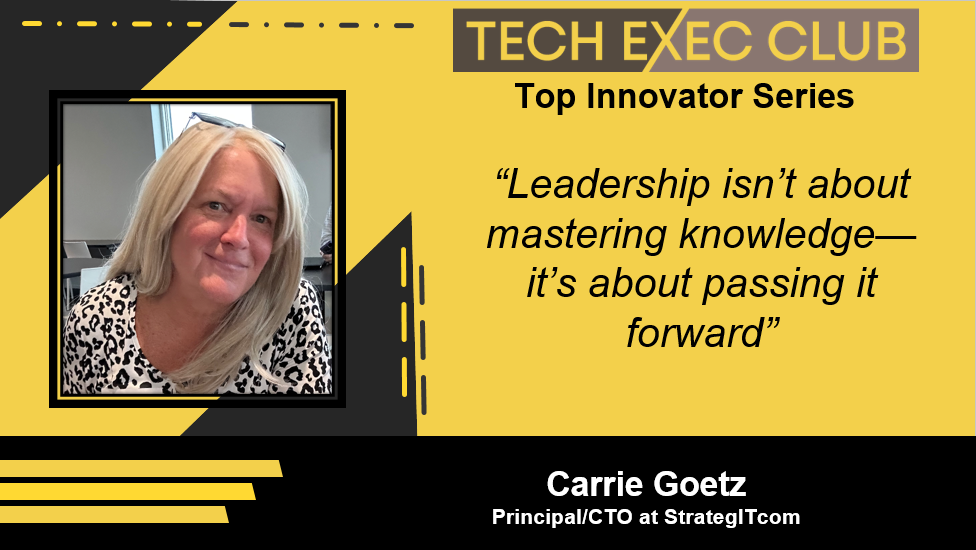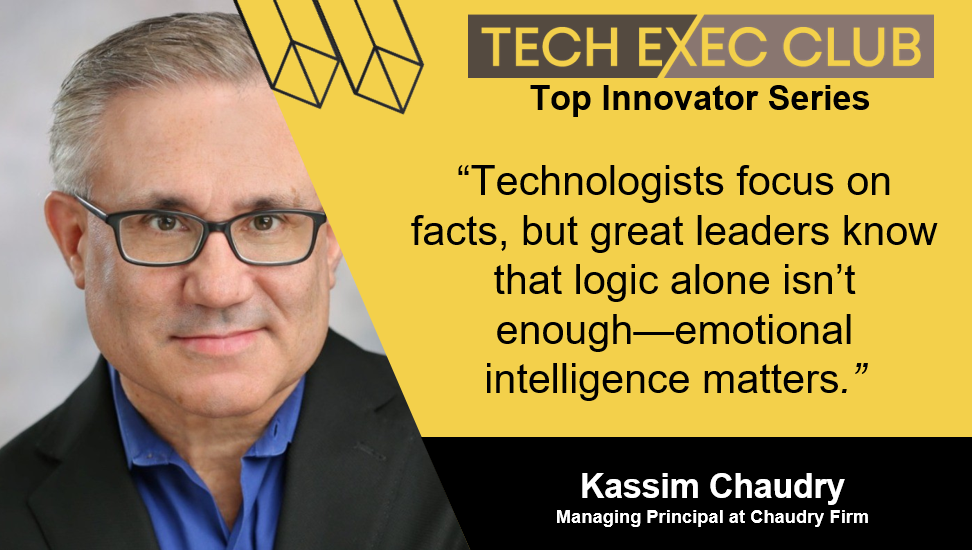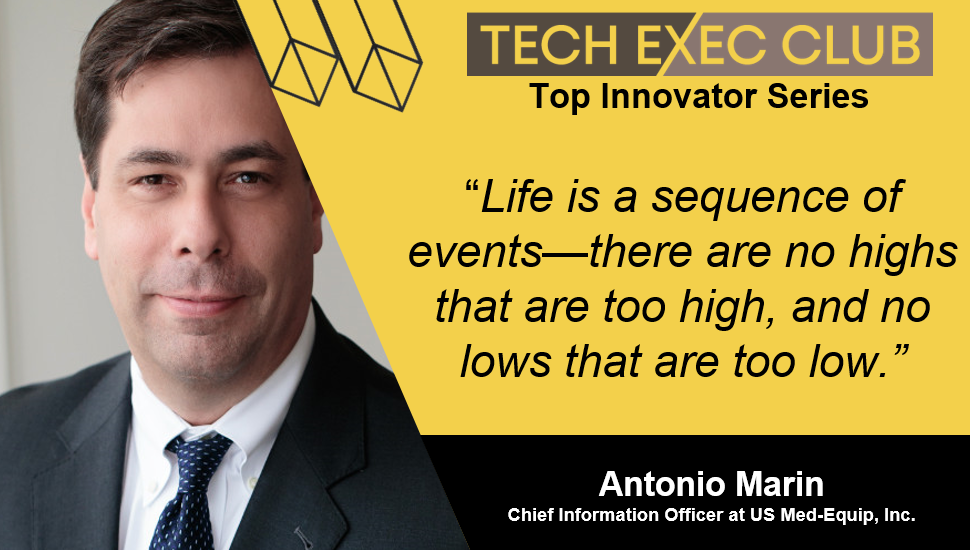In the ever-evolving world of business and technology, the line between innovation and execution is blurring faster than ever. But while many tech leaders double down on technical prowess, David LaRue believes the true differentiator lies elsewhere—in self-awareness, mentorship, and understanding how people, not just platforms, shape success.
As the founder of IQ4Hire, LaRue brings decades of executive experience spanning roles as CIO, CTO, and Head of Enterprise Architecture across industries. However, his leadership journey is unique in his ability to connect the dots between digital strategy, business value, and human development.
In this exclusive interview with Josef Martens, host of the Top Innovator Series and founder of the Tech Executive Club, LaRue opens up about what it takes to grow leaders, not just launch systems. From his early days at Ford Motor Company—where he learned to sell what he built—to his insights on mentorship, innovation derailers, and creating leadership legacies, LaRue offers a masterclass in future-ready leadership.
This isn’t just a story about technology. It’s a story about how great leaders learn, evolve, and shape the next generation by stepping outside the server room and into the boardroom—and beyond.
Business-First Tech Leadership: Why Understanding the Customer Comes Before Writing Code
For David LaRue, technology leadership doesn’t begin with the codebase—it starts with the customer. From the earliest days of his career, he realized that solving real-world business problems drives meaningful impact. “You’ve got to understand the customer’s struggles,” he says. Sometimes, the solution is technology, sometimes process, but the goal is always to create value.”
This business-first mindset became the foundation of LaRue’s career. His time at Ford Motor Company further solidified this approach, where he participated in a rotational leadership program that exposed him to sales, marketing, finance, and tech. The lesson? Great leaders are cross-functional thinkers.
That experience helped LaRue break away from the traditional siloed thinking many tech professionals adopt. While many technologists get lost in the complexity of systems, LaRue kept his eyes on the business outcome. He wasn’t just building systems—he was shaping strategies, pitching solutions, and delivering measurable results.
That business orientation didn’t just serve him—it elevated his teams. By focusing on impact over implementation, LaRue learned how to align engineers, product owners, and executives around a common business narrative—a skill that set him apart in every role he held.
Mentorship and Career Ownership: Growing Yourself and Others
Throughout his career, David LaRue has carried two mantras: get good at what you do and never stop growing. He credits much of his professional trajectory to powerful mentors—some of whom weren’t even in tech. Lawyers, strategists, and business leaders all shaped his mindset and helped him develop broader perspectives.
But LaRue didn’t just receive mentorship—he deliberately built it into the organizations he led. Whether at True Value/ Do it Best, DeVry / Adtalem Global Education, or Sirva (global moving, real estate and mortgage), he helped launch mentorship programs designed to cultivate leadership at all levels. Why? Because leadership is a team sport, and the next generation must be coached—not just promoted.
His advice to rising leaders? Don’t wait for permission—own your growth. Raise your hand for cross-functional work, seek out informal mentors, and step beyond your comfort zone. “You don’t need a formal rotation program to learn,” LaRue says. “Just volunteer for something that stretches your thinking.”
Even now, LaRue continues to seek mentorship himself. With a growing interest in venture capital, he’s proactively looking for experienced voices to help guide his evolution. It’s a powerful reminder that no matter how senior you are, you’re never done learning—and never too accomplished to be coached.
Self-Awareness as a Core Leadership Skill
If there’s one leadership lesson David LaRue wishes more tech executives internalized, it’s this: leadership starts with self-awareness.
“It’s a blind spot for many,” he says. “You can’t lead others effectively until you understand how you show up, communicate, and how your behavior impacts a team.”
LaRue views self-awareness not as a soft skill but as a strategic imperative. Without it, leaders miss cues, misunderstand team dynamics, and often fall into performance traps. With it, they build trust faster, resolve conflict more efficiently, and inspire greater engagement.
Self-awareness isn’t static. “You have to keep revisiting it,” LaRue explains. As your role changes, so do your leadership challenges. That’s why he continues to reflect, ask for feedback, and invest in his growth—not just for personal gain but because it’s the foundation of leaving a meaningful leadership legacy.
In a world where technological fluency is prized, LaRue reminds us that emotional fluency matters just as much. At the end of the day, leading people is still about people—not platforms.
The Innovation Paradox: Why Great Ideas Struggle Inside Great Companies
Innovation may be a buzzword, but David LaRue knows the real-world barriers that can smother it before it ever takes flight. He calls it the “white blood cell effect”—the phenomenon where established systems, processes, and metrics attack new ideas like viruses, rejecting them because they are too unfamiliar, risky, or slow to show ROI.
“Innovation needs space to breathe,” he says. “You can’t expect a new idea to hit traditional benchmarks immediately.”
LaRue’s answer? Innovation incubators—dedicated environments where early-stage ideas can be nurtured without the pressure of immediate profitability. But that’s only part of the equation. Innovation also needs a visionary leader willing to protect the flame, even when the organization pushes back.
He also emphasizes the need for diverse thinking in innovation teams. “You don’t want people who only agree—you want people who challenge the vision, stress-test the plan, and bring multiple disciplines together.”
Having earned multiple innovation awards and formal certification in innovation management, LaRue understands that successful innovation is part creativity, part execution, and part structure. “It’s not just about ideas,” he says. “It’s about having a process that gives those ideas a chance to grow into something real.”
Leadership Legacy: Building Beyond the Boardroom
While many leaders focus on performance metrics and promotion tracks, David LaRue is already thinking beyond those things and about the legacy he wants to leave behind.
For him, leadership isn’t just about delivering quarterly results—it’s about building people, investing in communities, and shaping systems that continue to thrive long after he’s gone.
Now based in Atlanta, LaRue is actively looking to engage more deeply with local innovation communities and youth mentorship programs—just as he did in Chicago, where he helped early-career technologists navigate their first steps in the industry.
“I can’t see myself slowing down,” he says. “But I do see myself doing more work that matters beyond the traditional business setting.”
His future leadership path is twofold: personal growth—through continuous learning and evolving leadership skills—and community impact, mentoring the next generation, and shaping inclusive innovation ecosystems.
In a world where leadership is often equated with title and authority, LaRue offers a different model: a legacy of empowerment, contribution, and quiet, consistent transformation.
David LaRue’s career is a testament to what’s possible when tech leadership is driven not just by expertise—but by purpose, growth, and human connection. His insights aren’t just inspirational—they’re actionable strategies you can implement today to grow as a leader and build stronger, more forward-thinking teams.
1. Start with the Customer, Not the Code: Anchor your technology decisions in real business and customer needs. Engage regularly with stakeholders to understand how your solutions impact operations, revenue, and user experience. Practice translating technical goals into business outcomes your organization cares about.
2. Pursue Cross-Functional Exposure: Step beyond your tech silo—join committees, shadow other departments, or volunteer for cross-team initiatives. Use rotational thinking—even informally—to build a broader leadership perspective. Encourage your team members to do the same to grow well-rounded, business-savvy technologists.
3. Build and Participate in Mentorship Programs: Be intentional about giving and receiving mentorship. Create space within your organization for mentorship opportunities—both formal and informal. Identify people outside your industry or discipline who can offer fresh perspectives and challenge your assumptions.
4. Own Your Career Growth: Don’t wait for your company to create a development plan—take the initiative. Proactively seek new skills, roles, and relationships to stretch your leadership capacity. Reflect on your career regularly and ask, “Am I becoming the leader I want to be?”
5. Invest in Self-Awareness: Make self-reflection a regular practice. Ask for feedback and evaluate your communication style, emotional triggers, and leadership impact. Use 360 reviews, personality assessments, or coaching to sharpen your self-understanding. Remember: leadership success starts with knowing yourself.
6. Protect Innovation from Organizational Resistance: Create safe spaces for innovation—pilot zones, incubators, or test labs that operate outside rigid business-as-usual constraints. Shield early-stage ideas from traditional KPIs until they’re mature enough to scale. Assemble diverse, cross-disciplinary teams to challenge assumptions and build breakthrough solutions.
7. Build a Leadership Legacy: Think beyond your role. What kind of impact do you want to leave on your people, your industry, and your community? Engage in volunteerism, mentoring, and innovation communities to extend your influence beyond the organization. Define your legacy now, not just at retirement.
David LaRue is far more than a seasoned executive or a digital strategist—he’s a leadership architect, innovation cultivator, and mentor to the next generation of tech leaders. His journey is a blueprint for how modern leadership should evolve: mastering the technology and human elements that turn ideas into impact.
Through a career spanning business, technology, and organizational development, LaRue has consistently demonstrated that great leadership isn’t just about execution—it’s about elevation—elevating people, elevating purpose, and elevating possibilities.
Whether driving innovation initiatives, guiding emerging professionals, or expanding his growth path, LaRue leads with clarity, humility, and a relentless commitment to helping others rise. His message is clear: if you want to lead in the future, you must invest in people, build systems that support ideas, and never stop learning.
Want to hear David LaRue’s insights firsthand? Watch the full, live podcast interview [click here]






